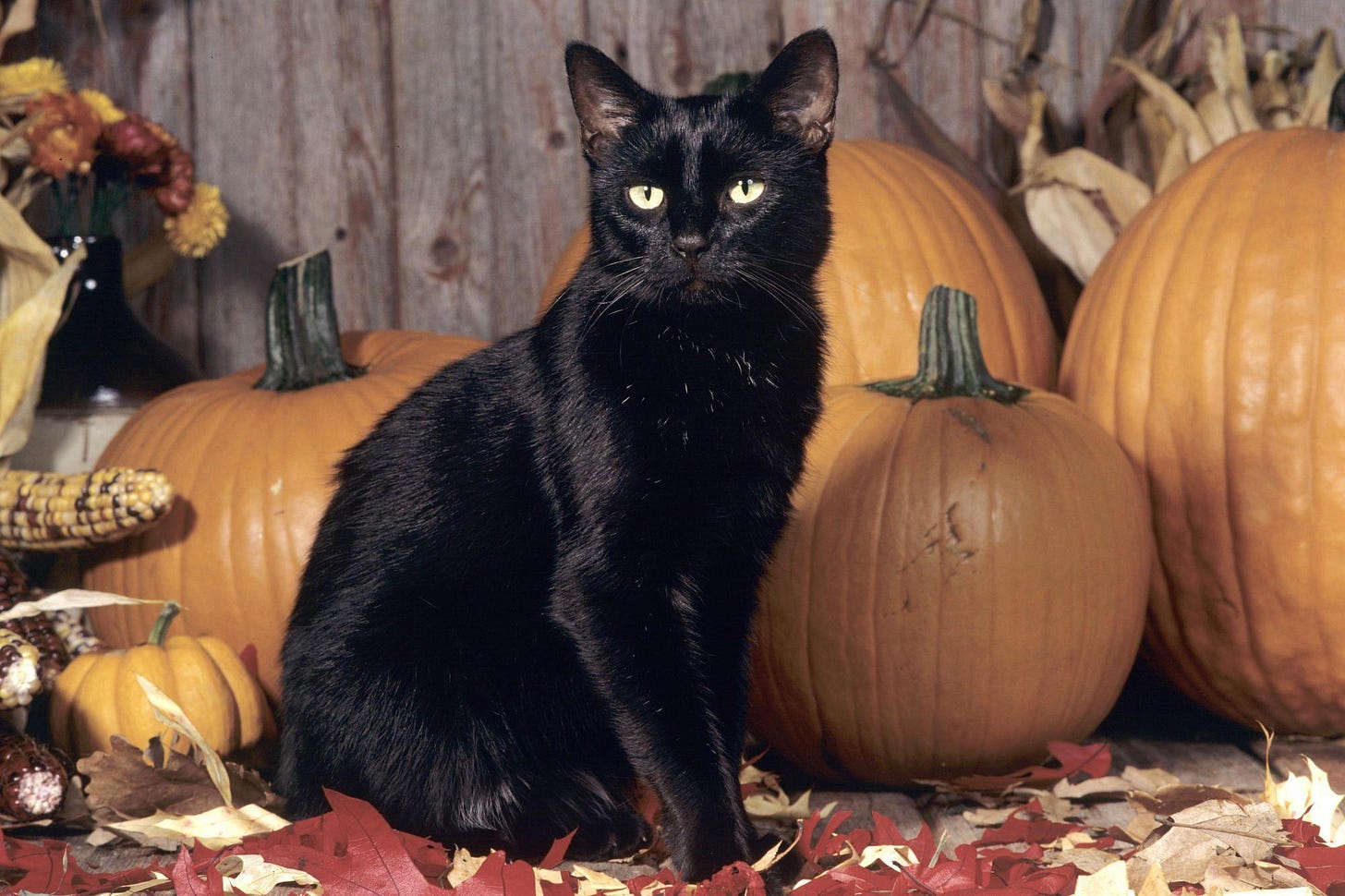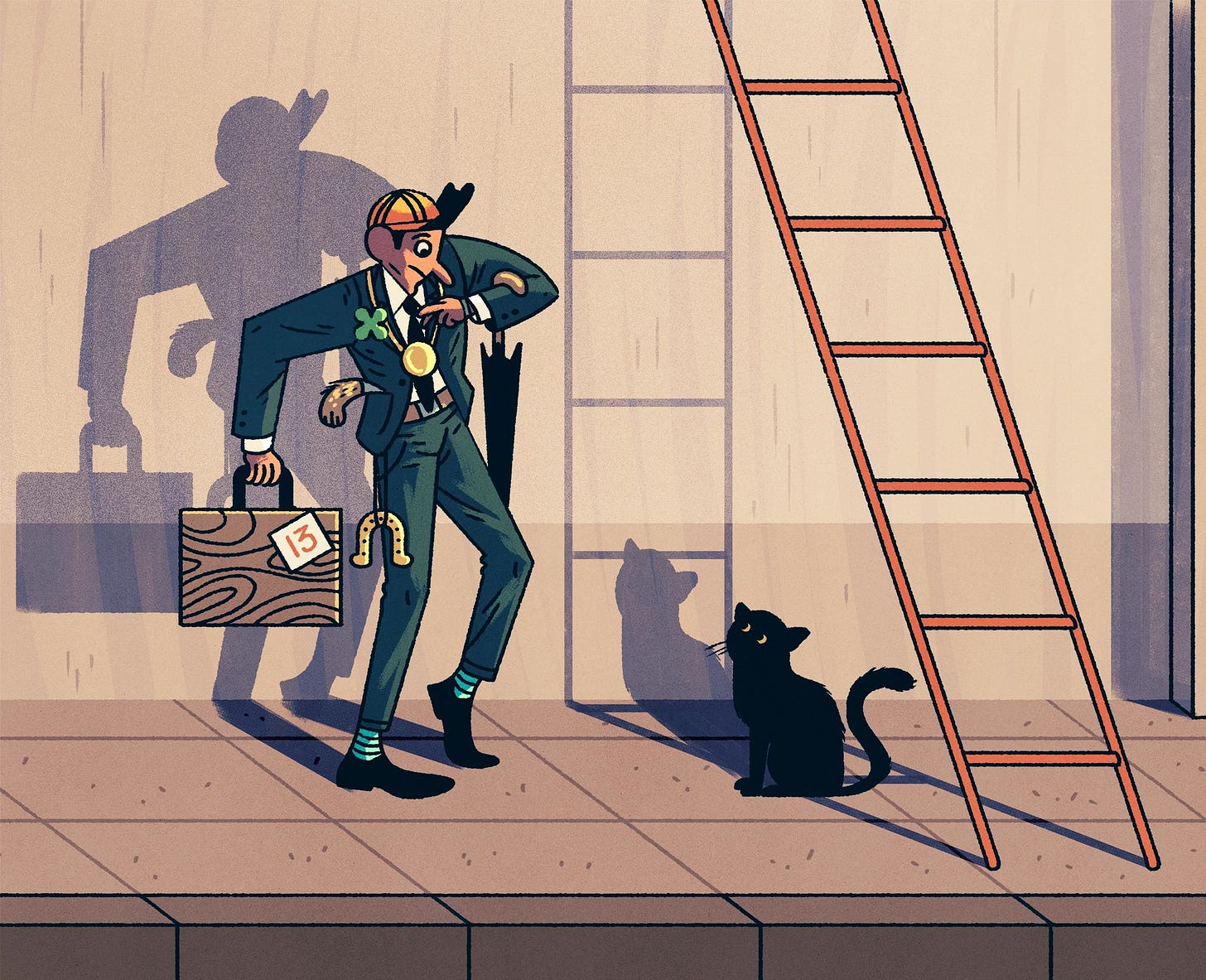Correction: As Faith mentioned in the comments tigers aren’t native to Africa and that the term safari wouldn’t be the proper term to use here. I changed the phrase “tiger on safari” to “predatory animals” in italics to make it more broad. A big mistake on my part!
As the years pass on the world continues to become more secular, abandoning old cultural and religious norms for modernity’s sake.
Whether or not this is good, it’s fascinating that many people may practice behaviors or lifestyle habits that may seem superstitious.
The American Heritage Dictionary defines superstitions as the following:
An irrational belief that an object, action, or circumstance not logically related to a course of events influences its outcome.
And an article published in JAMA in 1906 even provides a description of superstitions in regards to medicine, hitting on a few points we’ll discuss down below:
Superstition is a rather illusive word to define, and yet if we go back to its etymologic derivation from the Latin it is not difficult to understand. It comes from the Latin word superstes—a survivor. Superstitions then are survivals from a previous set of beliefs or opinions in any department of thinking which still continue to have their influence over men’s actions though they havelost their basis or supposed basisin truth because of the evolution of the department of thought in which they occur. In the old days when many phenomena that are now readily explicable on natural grounds were incapable of explanation, theories were invented, such as those of ghosts and witches, and these were supposed to afford the desired reasons for things which the human mind is always so prone to seek. Most of these beliefs have disappeared in the progress of modern science and of education, yet there are some people who still continue to be ruled or at least influenced by the survival of the old theories, that is, by superstitions.
We all are superstitious in one way or another, even if we don’t believe what we are doing is superstitious in nature.
Wearing gear for relating to your sports team in hopes that they win, carrying good luck charms, listening to your favorite song before a date or an interview, having “lucky” lottery numbers, and even prayers may be considered a form of superstition.
It’s believed that saying “bless you” after someone sneezes isn’t intended to be a polite gesture, but that a sneeze is a sign of your spirit leaving. Having someone say “bless you” is a way of preventing your soul from escaping.
Supposedly, if you spill salt the proper response is to take some extra salt and toss it over your shoulder.
It’s believed that this superstition may have come about during times in which salt was a high commodity, and spilling something so cherished would cause Death to sneak up from behind to reap your soul.
Tossing salt over the shoulder is intended to ward off Death, at least for the time being…
It can be argued that most folklore and cultural beliefs stemmed from superstitions that somehow carry on for hundreds or thousands of years, even if the roots of such beliefs become lost to history.
Even growing up it was quite common to throw around superstitions. I’m sure some of you have heard the following:
Don’t step on a crack or you’ll break your mother’s back.
Breaking a mirror is 7 years bad luck.
Don’t open an umbrella indoors.
Watch out for black cats.
Be careful on Friday the 13th.
And pop culture has latched onto superstitions and has generally made it a trope in media such as this episode of Arthur (yes, I’m showing my age here!) in which the Brain questions the concept of superstitions, only to have it backfire on him.
On the other extreme, the Final Destination series served as a more radical portrayal of the superstitious, in which characters looked for “clues” after surviving fatal accidents, hoping that they can see signs of possible impending death.
Of course, anyone who has watched any of the films noticed how fruitless such endeavors were, and I’m sure most viewers just gave up on the actual superstitious portion and cared more for the ever increasingly gory death scenes.
As ridiculous as these deaths were, it’s quite clear that these movies had a lasting cultural effect which caused many people to look for supposed signs before a catastrophic event.
There’s also, of course, the Stevie Wonder song that we are all familiar with.
In modern times we may even infer some sort of superstitious nature to things such as mask wearing, in which case some people may argue that wearing a mask makes them feel more protected or safer even if all they are wearing is a poorly worn surgical mask that, scientifically speaking, certainly won’t provide any protection.
It’s the belief in the ritualistic, reinforced behavior of mask wearing rather than the scientific evidence that poorly worn, cheap masks may help someone from getting sick.
It’s quite ironic that a more secular, “rational” world still clings onto superstitious beliefs, and yet even now superstitions continue to carry on suggesting that it’s something that could possibly have helped our species.
So why exactly are we superstitious?
From one perspective, it could be that superstitions may lead to risk-averse behavior that prove beneficial in the long run. Those who may see clues or associations, even if they may be illogical, may survive long enough to pass on their genes to offspring who then may carry on that risk-averse trait—a lighter version of The Final Destination rules I suppose.
Take the idea that color patterns that may look similar to predatory animals may cause hunters to avoid such similarities, even if it may end up being an innocuous plant. The more more reckless hunter may make the wrong mistake and get himself killed while more careful hunters, who may be superstitious may avoid certain death.
Behaviors and ideas that enforce a “better safe than sorry” mentality may persist due to the fact that risk-aversion may provide some fitness advantage over pure reckless abandonment.
Another possibility may stem from the lack of knowledge to explain events leading to the emergence of superstitious beliefs.
One review from Risen, J.1 breaks down superstitious thinking into two dynamic systems:
System 1 focuses on intuitive thought and heuristics that occur when exposed to some phenomenon i.e. attributing phenomena to supernatural beliefs.
System 2 engages a feedback of rational thought and context in order to provide other explanations for said phenomenon. Lack of System 2 engagement may lead superstitious thoughts to persist.
As such, knowledge and information may provide logical explanations for otherwise illogical thoughts before they become superstitions. In times when no viable explanation could be found for the natural world, our ancestors may have turned to supernatural explanations.
Explanations for weather, crop destruction, and disease which could not be described through scientific or rational methods at the time may be relegated to beings or practices, and the act of superstition may be done as a way of assuaging such beings, hence some of the superstitions surrounding vampires and garlic.
Essentially, an improper cause/effect relationship may be created through mere associations that tend to persist.
This is probably the most common explanation for superstitions in my opinion.
The ability for superstitions to persist also relies on social dynamics and the adoption of social norms, therefore drawing from aspects of game theory.
Now, I hear of game theory quite often but I’ll be blunt and state that I’ve always found it rather confusing. I think the follow definition from the American Heritage Dictionary works pretty well, but if anyone well-versed in game theory can enlighten me that would be nice:
A branch of mathematics that deals with strategies for maximizing gains or minimizing losses in competitive situations having defined constraints and involving random factors.
As I stated, I get lost a bit in the weeds with how game theory is described.
In this case, it appears that game theory would suggest that individuals create their own superstitious beliefs which then may interact with the superstitions of others. Through trial, beliefs that would appear to provide some benefit may end up becoming adopted in a wider context until it becomes a social norm. Game theory, in effect, provides a broader explanation for how superstitions are adopted in a wider social context.
One model comes from Morsky, B. & Ackay, E.2 Although the model is a bit over my head I believe this excerpt from the Discussion provides the proper framework:
Rather than being designed, the choreography of play through consistent belief emerges from the accumulation of random superstitions of the environment. In alignment with empirical work (51, 52), our norms start out at the individual level as subjective norms ascribing meaning to events in the world: whether they be seeing a colored cat or something equally superstitious. If these subjective norms are rational to follow given the beliefs that they induce and yield a high payoff, they can win in evolutionary competition and acquire conventional normative meaning. In this way, normative meaning invented at the personal level provides the material for conventional meaning to emerge through the joint action of individual rationality and evolutionary dynamics.
Put another way, we may ascribe good luck or bad luck to completely extraneous events. If we behave in a specific manner based on those extraneous objects or events, and that causes a specific outcome we may tie the extraneous event to the outcome creating a superstition. If that superstition helps us in some way, such as wearing lucky charms or avoiding specific objects winning us money, then that reinforces such superstitious behavior.
Let’s say a black cat is present while you play a game (video, sports, board, whichever you prefer). The presence of the black cat is extraneous. However, if we lose we may consider that the black cat brought us bad luck and may choose to avoid seeing it around.
If it’s not around and you win a different match, that may enforce the notion that the cat was indeed bad luck. Similar experiences, or shared gossip with others of such bad luck from seeing a black cat may create a social norm that enforced the idea that black cats are things to avoid, leading to a broader adoption of a superstition and solidifying such beliefs as social norms.
In any case, superstitions have existed with our species for many many years. Whether there is some evolutionary basis for such beliefs, the fact that it continues to persist in the modern era tells us that there may have been some value in carrying such a belief system.
It quite possible could be an example of the phrase “literally false; metaphorically true”.
At the end of the day, the belief in superstitions alone is not detrimental. We have been superstitious creatures for many years, and we will more than likely continue to be so.
This may only become an issue when superstition causes one to dictate how to live their lives. Be careful in confusing superstition with paranoia, especially if it affects how you live.
Halloween Superstitions
Of course, a post on superstitions must include things related to Halloween or the dead!
Note that some of these superstitions may not be factual, so take them with a grain of salt…
Jack-O-Lanterns
The all-too common tradition of carving pumpkins and lighting them with candles may have come all the way from Ireland.
Of course, pumpkins being a New World fruit meant that they could not have been the original plant to be carved into.
In Ireland, it’s believed that turnips and potatoes were carved to have scary faces, and it comes from the story of a man named Stingy Jack who supposedly tricked the Devil until Jack’s eventual death where he was forced to roam the Earth (taking from History.com):
The practice originated from an Irish myth about a man nicknamed “Stingy Jack.” According to the story, Stingy Jack invited the Devil to have a drink with him. True to his name, Stingy Jack didn’t want to pay for his drink, so he convinced the Devil to turn himself into a coin that Jack could use to buy their drinks. Once the Devil did so, Jack decided to keep the money and put it into his pocket next to a silver cross, which prevented the Devil from changing back into his original form.
Jack eventually freed the Devil, under the condition that he would not bother Jack for one year and that, should Jack die, he would not claim his soul. The next year, Jack again tricked the Devil into climbing into a tree to pick a piece of fruit. While he was up in the tree, Jack carved a sign of the cross into the tree’s bark so that the Devil could not come down until the Devil promised Jack not to bother him for ten more years.
Soon after, Jack died. As the legend goes, God would not allow such an unsavory figure into heaven. The Devil, upset by the trick Jack had played on him and keeping his word not to claim his soul, would not allow Jack into hell. He sent Jack off into the dark night with only a burning coal to light his way. Jack put the coal into a carved-out turnip and has been roaming the Earth with ever since. The Irish began to refer to this ghostly figure as “Jack of the Lantern,” and then, simply “Jack O’Lantern.”
It’s believed that these carved turnips and pumpkins would ward off evil spirits, especially Jack.
Irish immigrants likely brought this tradition to the US where it carried over into pumpkins, eventually leading to the pumpkin jack-o-lanterns we see today.
And so the tradition lives on. Maybe this Halloween you may want to consider leaving a few jack-o-lanterns out, lest Jack decides to give you a visit this year!
Black Cats
I probably shouldn’t have included black cats for my “game theory” example, but I guess I can’t be blamed for having cats on my mind.
Just like jack-o-lanterns black cats have become synonymous with Halloween. But unlike the gutted gourds, black cats have become a symbol of bad luck.
In fact, it’s not too difficult to find articles raising all sorts of concerns over black cat, generally in the vein that black cats may be harmed this time of year. Some adoption centers may even be concerned that superstitions over bad luck may cause people to abuse black cats.
Fortunately, there doesn’t appear to be strong evidence of the sort, and in fact it may be a bigger issue of people adopting black cats as Halloween props only to quickly return them or discard them when done.
But why exactly did cats, especially black cats in particular get such a bad rep?

Some reasons may stem from a clash between Christianity and pagan practices, where black cats began to be associated with witches and witchcraft.
Many early civilizations revered cats, and it’s believed that the Greek god Hecate had a cat:
Cats also made an appearance in Greek mythology, specifically Hecate, goddess of magic, sorcery, the moon and witchcraft, was described as having a cat as both a pet and a familiar (a supernatural creature that assists a witch, according to European folklore).
As the story goes, this “familiar” was a midwife of Alcmene (Heracles's mother) named Galinthias, who tricked Eileithyia the goddess of childbirth so that Alcmene could give birth to Heracles. The angered goddess Hera (wife of Zeus), who was envious of Alcmene and wanted to prevent the birth, would transform Galinthias into a cat (or possibly a weasel) to punish her for her actions. Hecate would then take pity on Galinthias and make her an attendant.
So even in ancient times there existed evidence of cats being associated with witches of some sort, and this association could have led to the bad reps black cats would eventually get.
For instance, there are some accounts from the Catholic church implying that black cats were associating with Satan (from History.com, links removed):
Written records link black cats to the occult as far back as the 13th century when an official church document called “Vox in Rama” was issued by Pope Gregory IX on June 13, 1233. “In it, black cats were declared an incarnation of Satan,” says Layla Morgan Wilde, author of Black Cats Tell: True Tales And Inspiring Images. “The decree marked the beginning of the inquisition and church-sanctioned heretic and/or witch hunts. Initially it was designed to squash the growing cult of Luciferians in Germany, but quickly spread across Europe.”
Over time as monotheistic religions spread and came at odds with paganism The Church began to target so-called witches and hunt them down. Cats may have been implicated due to being a common pet for so-called witches, although the reason why black cats were targeted in particular are unclear. However, if the notes in the Vox in Rama are to be true then it could be that black cats were targeted specifically due to being named Satan incarnates.
In any case, this association lived on even into the Middle Ages where cats were considered to be the source of the plague and killed which, ironically, led to a greater spread due to the actual vector being rodents whos numbers were no longer kept in check.
But what about crossing paths and all that nonsense?
It could be that cats were considered to be witches in disguise, or may be sent out to do a witch’s (or the devil’s) bidding, and so a black cat crossing could be an intentionally evil omen. The accounts here are a little vague, but it again generally points back to some association to witches and witchcraft.
In any case, the superstitions around black cats continue to live on making it’s way into the Halloween tradition. Although accounts of black cats being targeted through fear of bad omens may be overblown, it’s important to remember that they are animals and shouldn’t be harmed or used as props for the sake of some belief or novelty.
And besides, even it does happen to be a witch, wouldn’t you at least try not to anger them?
Alright, so that’s about all I have space for. As much as current cultural and social ideas change and evolve it’s amazing that superstitions continue to work their way into our lives in some way.
Please let me know if there are some superstitions you’d like to hear more about. I’d also like to hear what superstitions some of you may have, especially ones fitting to this time of year!

If you enjoyed this post and other works please consider supporting me through a paid Substack subscription or through my Ko-fi. Any bit helps, and it encourages independent creators and journalists outside the mainstream.

Risen J. L. (2016). Believing what we do not believe: Acquiescence to superstitious beliefs and other powerful intuitions. Psychological review, 123(2), 182–207. https://doi.org/10.1037/rev0000017
Morsky, B., & Akçay, E. (2019). Evolution of social norms and correlated equilibria. Proceedings of the National Academy of Sciences of the United States of America, 116(18), 8834–8839. https://doi.org/10.1073/pnas.1817095116







This interesting article gives me an opportunity to share the strangest moment of my life. I do not yet want to share it on my own substack.
Just a background on me, I am an agnostic (meaning that I do not believe in God, however I am open minded). I am partly an agnostic because I am not sure if applying "scientific method" to "existence of God is even appropriate because God is non-falsifiable.
So... A strange incident happened several years ago.
A worker of mine was behaving badly towards another employee and was mean. I asked him to stop, but he would not. Exasperated, I told him that I have a bad feeling that God will punish him for his misbehavior.
The employee started laughing and said that there is no God and how will he get punished? I said, I have no idea, and God will find His way. So he dismissed me and turned, laughing, ready to walk away. He did not notice a cable on the floor, slipped and fell down. He was hurt only superficially, however the immediateness of the consequence jarred me.
This incident left me totally shaken for DAYS because the punishment (fall) followed the moment of his blasphemy and laughter immediately. I also thought that it was very proportional -- and extremely close in time. Was it a freak accident? Or a punishment from God? I do NOT know.
I have this incident recorded on a security video (no sound).
Great food for thought here. I do take issue with that chart in the middle, where we have "System 2" thought as a dualistic choice - either we reject the "superstition" though "rational thought" or we embrace the superstition. I find a lot of so-called superstition actually has merit and I will often assess this using my rational mind.
For example, I am studying Vedic astrology. It seems superstitious on the surface but could energies from planetary bodies impact us, and somehow the ancients figured this out through meticulous observation? The first time I had a Vedic astrology reading, I was absolutely blown away by how much of my life history was in my chart, to the point where it freaked me out and made me reconsider the nature of reality...